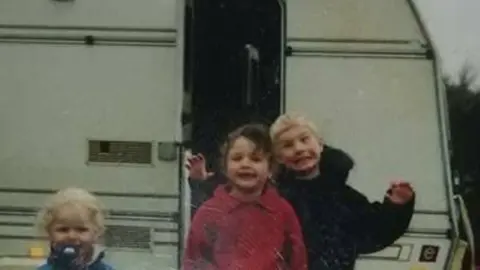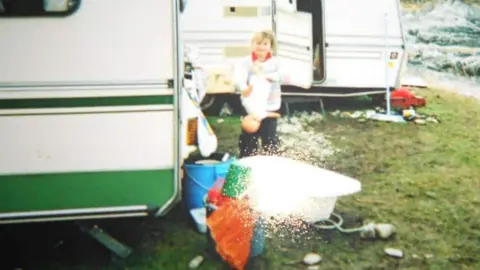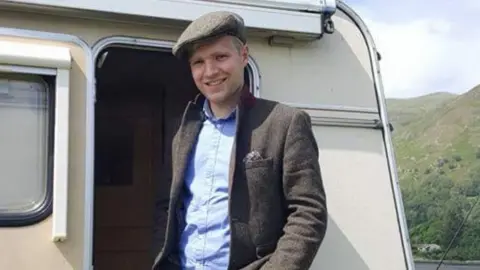Scottish Gypsies still face 'acceptable racism'
 Davie Donaldson
Davie DonaldsonDiscrimination against Gypsy/Travellers in Scotland has become the last form of "acceptable racism", a young campaigner claims.
Davie Donaldson, 19, said the public's view of Gypsy/Travellers had "remained stagnant" since the 1980s.
He said travellers faced discrimination in education and were often being prevented from setting up camps.
The Scottish Parliament's equalities committee is marking Human Rights Day 2017 by focusing on the issue.
It said research showed "entrenched and stubbornly high levels of discrimination" against the community.
The most recent Scottish Social Attitudes survey found 34% of people in Scotland believed a Gypsy/Traveller was "'unsuitable" to be a primary school teacher, and 31% would be unhappy if a close relative married a Gypsy/Traveller.

Davie Donaldson will give evidence to the committee.
He says he is the only Traveller he knows who has gone on to get a university education.
Institutionalised racism
According to Davie, Travellers face discrimination from other pupils and those in charge of schools
"School is really difficult," he said.
"There tends to be this institutionalised racism towards Travellers in schools."
He gives the example of his mother complaining to a teacher that she was not bothering to mark his homework.
 Davie Donaldson
Davie DonaldsonHe said his mum heard the teacher at the school gate say: "I don't know why she is complaining I know he's a Gypsy and he's not going to do anything with it any way."
Davie, who is now studying social anthropology with international relations at Aberdeen University, said every Traveller in Scotland had similar examples.
"It is not fair on a young child to block them out of those opportunities," he said.
Traditional camps
Davie was born in Perth and most of his family are Perthshire Travellers.
He said he attended a few different primary schools, having to continue to move due to discrimination and never quite fitting into the community.
Davie said they would go on the road every summer for months on end to traditional camps with cousins and extended family.
For a while his family lived on a Traveller site near Edinburgh called the Coal Camp, because it was on a former mine.
But eventually they moved into a house.
When he went to secondary school his father told Davie to do everything he could to hide his Traveller identity.
"That was really hard for me at school. Travellers are really proud people and trying to keep that hidden is horrendous."
 Davie Donaldson
Davie Donaldson"The only time at high school I told someone I was a Traveller I did it by accident," he said.
"They were calling someone else a Pikey and I called them out on it.
"I got so passionate that it was clear I was a Traveller. They were incredibly derogatory and offensive.
"It was really difficult from that point."
Official statistics say there are about 4,000 people in Scotland's Traveller community but others claim the true number is between 15,000 and 20,000.
David said: "In my mind there are upwards of 20,000 Scottish Travellers and for me to be the only one I know at university is horrendous."
"There is huge discrepancies in education for the settled community and the travelling community and that does act as a barrier for a lot of young travellers."
Formal education
Traveller men often place great importance on learning a portable skill early on and travel around seeking gardening work or collecting scrap to earn a living.
David admits that Travellers display a high level of distrust towards formal education.
"There is a feeling that they will forget who they are," he said.
"They will forget where they came from, the Traveller culture will be diluted.
"I think that is a really negative belief and I am thankful to say that is leaving the culture."
He wants Scottish education to take more pride in the Traveller culture.
"We have always been rooted in Scotland," he says.
"We are as much part of society as anyone else."
Another issue that concerns Davie is the shortage of legal stopping places for Travellers, which leads to unauthorised encampments.
These camps are set up in parks, greenbelt land and industrial estates, causing tensions with "settled communities" in the area.
Davie said the first reaction of the local authority was usually to find a way to evict the Travellers.
'Same as everyone else'
He said there should be a dialogue between Travellers and councils, with a view to agreeing terms for a camp to remain in one place for a set period.
Davie said people in the "settled community" needed to be more willing to meet Travellers.
He said: "We are the same as everyone else.
"We may have a unique culture but we have always been here.
"We are rooted here the same as everyone else. We are your fellow man."
A Scottish government spokesman said: "We recognise that Gypsy/Travellers are among the most disenfranchised and discriminated against in society, which is why we are determined to do all we can to remove barriers to achieving equality.
"We will publish a Race Equality Action Plan by the end of this year, which will include specific provision for Gypsy/Travellers and will be followed by a detailed programme of action."
